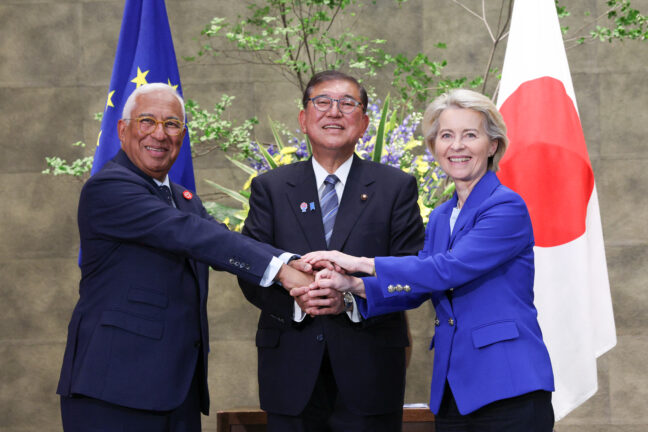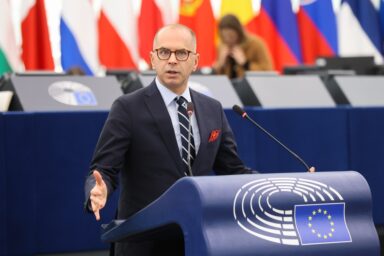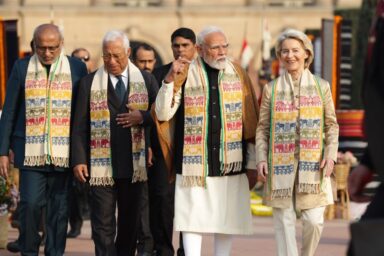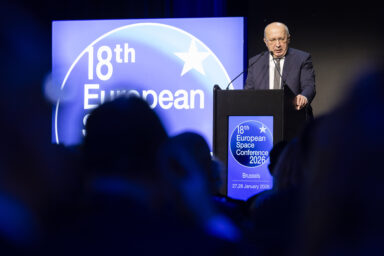The European Union and Japan held their summit in Tokyo on Wednesday, 23 July with EU leaders António Costa and Ursula von der Leyen meeting Japanese Prime Minister Shigeru Ishiba. Against a backdrop of increasing global instability, the summit focused on strengthening cooperation between major players committed to upholding the international rules-based order.
While previous EU-Japan summits mainly concentrated on trade issues – from digital to green initiatives – this year’s meeting expanded its agenda. The discussions included defence cooperation, economic resilience, and technological sovereignty. The summit reflected growing concerns over the war in Ukraine, tensions over the future of Taiwan, continuing Middle East instability, and – overall – a more unpredictable global environment. Shared commitments to democracy, human rights, and open markets continue to underpin the relationship. According to the leaders’ joint statement, the Japan-EU strategic partnership is “stronger… and more important than ever.”
Nuts & bolts
Besides the joint statement, leaders committed to a new competitiveness alliance. The President of the European Council, António Costa, outlined why Wednesday’s high level meeting was so important:
“Today’s summit is about strengthening partnership with concrete actions, especially in three key areas: security and defence, multilateralism, and trade and economic security. Security and defence are now at the core of the EU’s global engagement. Europe’s security is interlinked to the security in the Indo-Pacific,” Mr Costa said.
Today’s summit is about partnership, especially in three key areas: security and defence, multilateralism, and trade and economic security. – António Costa, President of the European Council
European Commission President Ursula von der Leyen thanked Japanese Prime Minister Shigeru Ishiba for hosting the summit, before praising as very impressive the Osaka World Expo. “This showed us something that Japan does extremely well, blending innovation and tradition,” she said warmly.
The Commission President continued by congratulating Japan on a successful tariff deal with the United States and said that the summit between the Japan and the European Union was coming at the right time. “The world is changing rapidly. For strategic partners like us it means being even closer to face the realities of our times,” Ursula von der Leyen said.
You might be interested
She outlined two main fronts that are currently ramping up the pressure. “Geoeconomics, with growing trade tensions and uncertainty, fragile supply chains, the challenge of overcapacity and unlevel playing fields. And, on the other hand, geopolitics, with rising threats to our shared stability and interests, from the battlefields of Ukraine to the waters of the Indo-Pacific. Today was about finding common answers and acting together,” the Commission President explained.
Japanese Prime Minister Shigeru Ishiba was on exactly the same page when it came to cooperating together. “A robust and stable EU-Japan relationship is essential,” he noted before discussing defence and economic ties. The EU and Japan represent a population of over 570 million people and together account for almost a quarter of global GDP and almost 20% of global trade in goods and services, counted together.
What was covered, what was agreed?
The summit resulted in agreements covering six main areas. These include security and defence, economic resilience, multilateral engagement, regional stability, environmental commitments, and human rights. Particularly notable:
Security and defence
Building on their 2024 security and defence partnership, the EU and Japan agreed to increase cooperation on cybersecurity, hybrid threats such as disinformation, and the protection of undersea infrastructure. Maritime security, including freedom of navigation, was highlighted. Partners also began formal negotiations on a security of information agreement to support future defence industry collaboration.
Economic security and resilience
The new EU–Japan Competitiveness Alliance will focus on critical minerals, semiconductors, and strategic supply chains. The partners emphasised the importance of countering unfair trade practices and economic coercion. EU and Japan also support reforms of the World Trade Organization (WTO) and closer economic coordination through the G7.
Digital and green transitions
Existing partnerships on AI, digital governance, circular economy, and decarbonisation were strengthened. The leaders reaffirmed their support for international climate goals, including COP30, and committed to tackling climate change, biodiversity loss, and pollution.
Multilateral and scientific cooperation
Both sides agreed to accelerate Japan’s association with the EU’s Horizon Europe research and innovation programme. They also confirmed ongoing cooperation on education, human rights, peacebuilding, counterterrorism, and cultural exchanges.
Regional issues
The leaders expressed unified positions on key geopolitical crises. They condemned Russia’s war in Ukraine, opposed Chinese military activities in the South China Sea, and criticized North Korea’s missile tests. They also called for a permanent ceasefire in Gaza. Partners stressed that Iran must not acquire nuclear weapons, and expressed concern about the humanitarian situation in Afghanistan.
Go big or go home? Go big, of course
This summit signals a deepening partnership between the EU and Japan. The two are broadening their cooperation beyond trade to include defence, economic security, and regional stability. By working more closely on these issues, they aim to better respond to challenges posed by global instability.
Beneath the formalities, this year’s summit reflected a practical shift. EU and Japan move beyond trade partnerships to closer coordination on defence, economic security, climate, digital governance, and regional challenges. In an increasingly complex global environment, it is clear shared values and common goals strengthen resolve to address major concerns. To directly or indirectly try to affect better outcomes through a shared sense of conviction.











